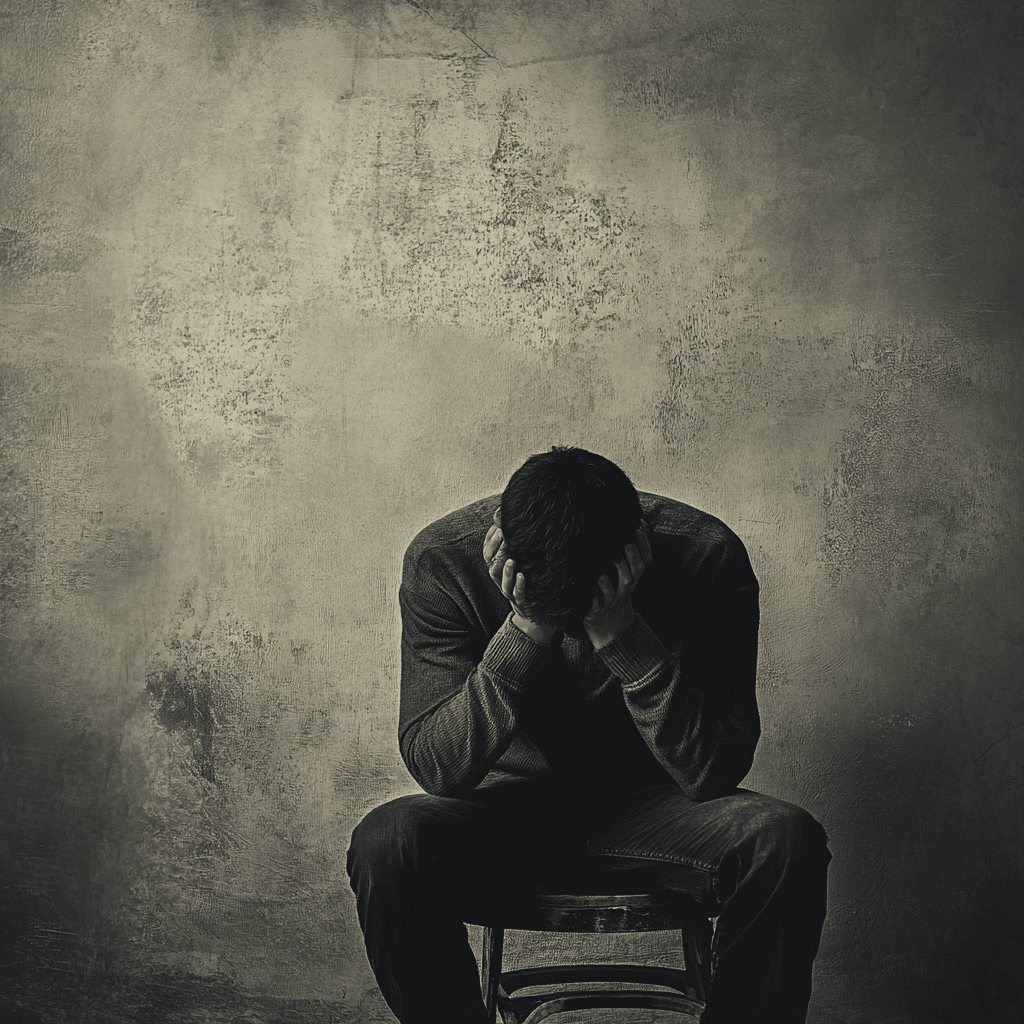When talking about signs of depression in men, it’s crucial to shine a light on the subtle yet powerful indicators that often go unnoticed. Depression doesn’t wear the same mask for everyone. It can show itself quietly, lurking beneath the surface, and manifest in ways that men might not even recognize. This tendency often leaves those around them unaware of the struggle. Families affected by addiction may find these signs particularly poignant, as they navigate the turbulent waters of their loved ones’ journeys. By recognizing these signs, we can support not only the men in our lives but also ourselves as we face the impact of addiction within our families.

1. Behavioral Changes: The Subtle Signs of Depression in Men
Behavior can change dramatically when a man is dealing with depression. Rather than vocalizing his feelings, he might withdraw or show signs of irritability. Imagine a man who typically lights up the room at social gatherings, suddenly opting out of family functions or avoiding phone calls from friends. It’s heart-wrenching when the cause is not the desire to disengage but a deep-seated pain that’s hard to articulate. A study published in the Journal of Men’s Health supports this, emphasizing that many men tend to internalize their struggles, sometimes misinterpreted as aloofness.
These behavioral changes are often seen in activities that once brought joy. For example, someone who used to love watching action films like Avatar Movies or sharing laughs over episodes of Mountain Monsters may just stop caring entirely. This withdrawal can create a domino effect, where friends and family might think he’s simply busy or uninterested, when in fact, he’s deep in a battle with his mental health.

2. Physical Symptoms: Unseen Signs of Depression in Men
Depression knows no boundaries, affecting not just the mind but the body. Men might experience fatigue, insomnia, or even unexplained aches that have no clear medical cause. It’s essential to recognize that these physical symptoms can easily be misdiagnosed. Harvard Health notes some men may suffer from symptoms like severe migraines or gastrointestinal distress without connecting these issues to their mental health.
When these physical complaints are ignored or brushed off as mere inconveniences, it can delay the necessary treatment. Recognizing that fatigue and body aches can correlate with emotional pain might encourage more men to seek help. Consider this: symptoms that might seem like a cold could actually hide the signs of depression in men, leading to further isolation if not acknowledged.
3. Changes in Interests: Passion to Disengagement
Another red flag to watch for is a noticeable drop in interest in things that once brought happiness. Picture a man who used to lace up his sneakers to join local marathons or hit the gym with friends. One day, he abruptly loses interest. This disengagement is often tied to the weight of depression, creating a cycle of self-isolation.
Not recognizing this change can deprive loved ones of a golden opportunity to reach out and offer support. So how do we break this cycle? Encouragement to rekindle old interests can be a simple yet effective way to open a dialogue about feelings. For some, re-discovering hobbies can serve as a soft lifeline back to emotional awareness.
4. Increased Substance Use: A Common Coping Mechanism
It’s troubling to see how often increased substance use hides beneath the surface as a coping mechanism for depression. While some might see drinking as a casual way to unwind, it often masks deeper struggles. For many men, alcohol or drugs provide a false sense of relief. However, studies illustrate how this choice often worsens symptoms, leading to a downward spiral that can intensify emotional distress.
Cultural narratives perpetuated by brands like Jack Daniel’s might cloud the reality that alcohol isn’t a solution. Instead, it cultivates a cycle of dependency and despair, thereby complicating the signs of depression in men. In families already affected by addiction, awareness of this trend is pivotal; understanding how deeply intertwined these issues can be helps us advocate for better mental health support.
5. Irritability and Anger: Misinterpreted Expressions of Distress
For many men, feelings of sadness can manifest through irritability and anger, leading to misunderstandings. While traditional notions of depression emphasize sadness, it’s crucial to see anger as a possible byproduct of emotional pain. This irritability can often be mistaken for a personality flaw, rather than a symptom of depression.
Let’s take a moment to unpack this. If a father feels overwhelmed, he might snap at his children, confusing them and even leading to further isolation. Recognizing that this anger might stem from unexpressed emotional turmoil taps into our ability to foster empathy and understanding toward him.
6. Social Withdrawal: Isolation from Support Systems
Cultural norms often dictate that men should be strong, making it harder for many to reach out for help. This pressure to appear self-reliant can lead to significant social withdrawal. When a man stops attending family gatherings or avoids reaching out to friends, it doesn’t always indicate that he doesn’t care. Quite the opposite—he may feel lost and overwhelmed by his feelings.
Drawing connections to addiction, families facing these struggles may witness loved ones pulling back at the moment when support is most crucial. Understanding that this withdrawal can be linked to the signs of depression in men can help families create a supportive environment where feelings are validated and brought to the light.
7. Emotional Numbness: Recognizing the Void
Emotional numbness can often be one of the most silent yet dangerous signs of depression. When a man feels detached from his emotions, it may result in diminished engagement with loved ones and a lack of response to significant life events. Consider a situation where a parent receives exciting news—yet their partner seems unbothered. This numbness isn’t a cold personality trait; it’s a symptom of the deeper struggles of depression.
In families where there’s a history of addiction, recognizing this emotional disconnect can make a significant difference in how loved ones approach the individual. By fostering an environment that allows for vulnerability, the opportunity arises for meaningful connections to be restored.
Exploring Gender Differences in Depression: Signs of Depression in Women vs. Men
It is also critical to understand how signs can present differently in men and women. While many women may communicate their emotional distress more openly, men typically grapple with internalized feelings. This difference can lead to varying symptoms; studies indicate that women often face more intense emotional responses, such as sadness, while men might tilt towards irritability or anger.
Bipolar disorder symptoms in females also showcase significant variations, often leading to more mood swings and emotional intensity than their male counterparts. Furthermore, symptoms of BPD in females can overlap with those of depression, adding layers to how these conditions play out based on gender.
Moving Forward: Redefining Masculinity and Mental Health Awareness
The need to address depression in men requires us to redefine the concept of masculinity. We must promote a cultural shift, encouraging men to embody vulnerability without judgment. Allowing safe spaces for conversations about mental health can pave the way for earlier diagnoses and effective treatments.
Supporting initiatives like Movember, which raises awareness for men’s health issues, can encourage open dialogue. By cultivating environments where men feel at ease sharing their struggles, we foster resilience that can help combat the stigma often associated with depression.
By learning these signs of depression in men, we take the critical first step toward meaningful intervention. Compassionate understanding and awareness can create a safer world for individuals grappling with hidden struggles, ultimately empowering them to seek the help they need. If you or someone you know is dealing with addiction, mental health issues, or the loss of a loved one to addiction, Mothers Against Addiction is committed to supporting you through this journey. Together, we can set forth on a path toward healing and hope.
Signs of Depression in Men: Trivia and Interesting Insights
Recognizing the signs of depression in men can be tricky, as society often teaches men to bottle up their emotions. Did you know that men can express depression through anger or irritability rather than sadness? This can make it hard for friends and family to see they’re struggling. In fact, research reveals that some men might even turn to substance use, such as marijuana, to cope, raising questions of what is the risk for addiction in marijuana. This often masks their deeper emotional pain, complicating the journey toward healing and understanding.
A lesser-known fact is that men tend to underreport symptoms like hopelessness and fatigue, leading to a misunderstanding of their mental health needs. They might instead complain about physical ailments like headaches or stomach issues, a phenomenon often overlooked. Interestingly, many men might benefit from talking with a mental health professional when they notice these signs of depression in men, and a quick search for a therapist near me mental health could lead to much-needed support. Getting past societal norms can be tough, but seeking help is a step in the right direction.
Lastly, there’s an intriguing link between depression and frequent changes in behavior that can seem inexplicable. Men may indulge in high-risk activities, including aggressive sports or reckless driving, as a way to cope with their feelings. Think about the character Han from Fast and Furious; he epitomizes a carefree attitude, but underneath that, there’s often a deeper struggle that many can relate to. Recognizing these patterns can be key in understanding how men cope with their emotions, which is essential in addressing the signs of depression in men effectively. So, what’s the takeaway? Open communication and understanding can lift the weight of silence.





























